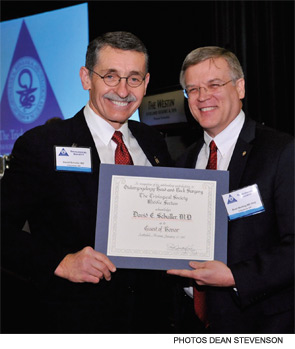
Explore This Issue
February 2011SCOTTSDALE—The system of clinical cancer research, including that of head and neck cancer, is in need of an overhaul, but steps are being taken that might lead to more efficient work and will hopefully mean more medical breakthroughs, said David Schuller, MD, the chair in cancer research at the Ohio State University College of Medicine in Columbus, at the Triological Society’s Combined Sections Meeting, held here on Jan. 27.
“It truly is an inefficient process,” said Dr. Schuller, a guest speaker at the meeting. “There are a lot of delays. There is really not much in the way of formal prioritization.”
Federal funding has been stagnant for the past several years, stuck at about $160 million a year, he said. Additionally, he said, there is “extensive, if not excessive, oversight of the process.”
There are now 10 organized cancer cooperative research groups, composed of 14,000 investigators—making for a fierce competition for study subjects.
“They only accrue 25,000 patients a year,” said Dr. Schuller, a co-chair of the National Cancer Institute (NCI) Head and Neck Steering Committee. “And so we have a bunch of physicians that are bumping into one another that are waiting for the next patient to be approved to a trial.” When it comes to more uncommon malignancies, the problem is worse, he said.
But, he said, “there are also possible solutions. It’s not that this has been an unrecognized problem.”
Recommendations
In 2005, the NCI created a series of steering committees tasked with coordinating cancer research throughout the U.S. The steering committee for head and neck cancer was formed in 2007.
At the NCI’s request, the Institute of Medicine (IOM) conducted a review of the Clinical Trials Cooperative Group Program. The IOM released its report in 2010 that included goals for the NCI, including improving the speed and efficiency of trials, incorporating innovative science and trial design, improving prioritization and selection of trials and better incentivizing for physicians and patients who participate.
To do this, the IOM recommended consolidating some research groups using pre-defined metrics to make those choices; downsizing disease-site committees; consolidating back-office operations; better coordinating and streamlining protocol development and increasing reimbursements in high-ranked trials.
The IOM also recommended the implementation of a national inventory of biosamples, a suggestion that Dr. Schuller said was particularly important.
Leave a Reply